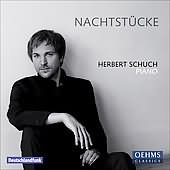Herbert Schuch’s provocatively programmed recital built around “Night Pieces” matches and perhaps even surpasses the extraordinary standards set by the young pianist’s earlier Oehms Classics solo release. Few keyboard artists have conveyed the somber darkness and lyrical light that characterize Schumann’s Nachstücke Op. 23 to Schuch’s detailed standards. His deliberately heavy tread in the first piece never compromises the sharp profile he brings to the obsessive dotted rhythms. The second piece’s rapid chords are perfectly voiced, splinter free, and polyphonically aware, while discreet pedaling underlines the rolling accompaniment’s feeling of unrest that is all too easy to generalize. By contrast, the fourth piece stands out for Schuch’s eloquent simplicity and firmly centered singing tone.
The three short pieces encompassing Heinz Holliger’s Elis–Drei Nachtstücke feature spiky dissonant outbursts, long, sparsely populated lines, and resonant silences in the best post-Webern tradition. Schuch’s dynamic, caring rendition likely will be a point of reference for future interpreters.
Narrative coherence and an innate affinity for the composer’s sound world distinguishes Schuch’s command and control of the Scriabin Ninth sonata’s multi-dimensional textures. One of the most absorbing, accomplished, and individually profiled recordings of Ravel’s Gaspard de la nuit follows. Granted, some of Schuch’s tenutos and phrase-end ritards in Ondine seem artificially superimposed, yet the pianist’s frequently unorthodox pedalings and left-hand melodic accentuations restore the music’s taut linear essence much as Toscanini “unblurred” Debussy’s La Mer. He hauntingly sustains a slow basic tempo throughout Le Gibet, orchestrating the muffled chords, poignant tunes, and tolling B-flats to three-dimensional effect.
Like Pogorelich, Schuch’s tonal ripeness and curvaceous phrasing at the outset provides a frame of reference for when the opening theme returns “without expression”. The uncanny suppleness, accuracy, speed, and poise that Schuch brings to Scarbo must be heard to be believed: the quick high-register arpeggios will take your breath away if the dagger-like repeated notes haven’t slayed you first!
In this company Mozart’s B minor Adagio would seem anticlimactic, yet Schuch’s forward thrust and purposeful inflections shed grittier, more masculine light on a piece we often think of as inward and fragile. Although the engineering captures Schuch’s piano up close, the instrument sounds just as full-bodied, transparent, and alive as the music-making itself. One of the finest piano discs of 2009, or, for that matter, any other year. [6/3/2009]
































